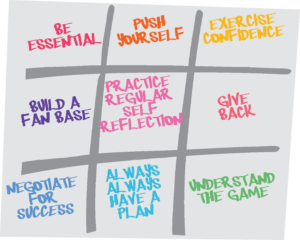Downloadable resource: Winning Action StrategyTM Action Ideas
Here’s what we know: The key to growth in your career is personal change. The best way to enact meaningful and effective personal change is to craft and implement a GOOD development plan.
What makes a development plan good? 1) It has to be meaningful to you. If you care about it, you’re more likely to follow through. 2) It has to get you where you want to go. It helps you reach your ambition and meet your needs.
Last week, we dove into the first part of a good development plan: defining your development focus. Now, it’s time to figure out how to put your personal change goals in motion. Like anything in life, personal change won’t happen without taking action! And meeting your career goals won’t happen without personal change.
Choose Actions for YOUR Development Focus
When choosing your development actions, you start by thinking about two things:
- Your career goal or ambition. What are you looking to achieve?
- Your needs. Which need do you want to try to better meet? It could be an unmet need or it could be a need that is met, but you want to make sure it stays that way.
Then, match that need to a development focus that will help. What personal change do you need in order to reach your goal and meet your needs?
Let’s revisit our Winning Action StrategiesTM. These are 9 great options to choose as your development focus. They’re probably not the only options, but they’re a great place to start if you aren’t sure.

After you select your development focus, you can focus on the “how.” What actions do you need to take to make your personal change happen? Here are 3 examples using our Winning Action Strategies:
Be Essential
To be essential means that you’re seen as a subject matter expert. People seek you out because you add significant value and make a difference. Others rely on you and feel that what you bring to the organization is mission critical. Beware: Many people think they’re more essential than they are!
You might choose to work on being essential if:
- You’re new to your role or organization.
- You were recently promoted or changed roles and want to make sure you add value.
- You received tough feedback that others need more from you.
- You want to stay relevant in your role.
- You would like to be promoted.
- You got a new boss.
The list could go on! Once you identify that this development focus is right for you based on your situation, think about action steps that can help you make progress toward this personal change.
Examples of action steps for Be Essential:
- Research and understand the overall organization objectives.
- Set clear, focused priorities.
- Communicate a lot – don’t do things alone.
- Seek out new, important projects/assignments.
- Connect with more senior leaders – listen and learn.
- Plan ahead; be proactive.
- Build strong customer relationships.
Practice Regular Self-Reflection
To practice regular self-reflection is to give serious thought and consideration to your character, actions, values, motives, behaviors, feelings, goals, ambitions and desires. Self-awareness is the outcome of that thought and consideration. Simply put, the reason you self-reflect is to improve your behavior, circumstances and, ultimately, yourself.
You might choose to work on practicing self-reflection if:
- You received critical feedback that felt unjustified.
- You seek personal growth – deepening alignment to your mission, values and ambitions.
- You want to improve interpersonal relationships at work or at home.
- You want to improve your leadership and the impact you make on the organization.
- You’ve been accused of being overly critical, harsh, tough or judgmental toward others.
- You want to be happier and experience more growth and connection.
If any of these reasons resonate with you (or if you can think of any other situation where self-reflection would help), then you’re in the right place. Now, brainstorm some action steps that will help you reflect more regularly.
Examples of action steps for Practice Regular Self-Reflection:
- Make self-reflecting a daily habit; be disciplined.
- Identify your values and align yourself.
- Be 100% truthful with yourself – make self-reflecting a “no spin zone.”
- Solicit and be open-minded to feedback – seek to understand.
- Don’t get defensive; focus on the learning.
- Engage with a therapist or coach to see yourself in new ways.
- Assess your decision-making process and its effectiveness.
Negotiate for Success
To negotiate for success means that you create greater value in your life and in the lives of others. Those who negotiate well tend to have better relationships, achieve greater results and get more of what they need. When you excel at negotiating, you understand that the sum of the deal is worth more than what any individual could achieve alone.
You might choose to work on negotiating for success if:
- You want to be a “go-to” for creating effective win-win solutions.
- You’re experiencing conflict that is getting in the way of your work.
- You struggle aligning on priorities for yourself and your team.
- Your role requires you to collaborate across functions with differing needs and perspectives.
- You desire a higher salary, more meaningful role or better benefits.
- You want to make more advantageous deals for your organization.
Examples of action steps for Negotiate for Success:
- Seek agreement on the problems to be solved.
- Listen A LOT; reflect their feelings, needs, expectations back to them.
- Show flexibility and search for smart trade-offs.
- Focus on the outcome you desire and compromise on smaller steps.
- Help others articulate what they want/need.
- Know what matters to you and incorporate that into your “ask.”
- Brush-up on the situation; know the higher-level concerns.
For even more examples of action ideas for every Winning Action Strategy, download our Action Ideashandout: Winning Action StrategyTM Action Ideas. It includes a bonus side for managers or leaders to help develop others too.
Tips for Writing Meaningful Action Steps You Actually Want To Do
1. Make them specific to you AND actionable. Some of our example action steps might sound vague – the intent is for you to use them as inspiration and turn them into actionable ideas that apply to your situation. This makes the action more achievable and easier to measure or adjust as needed.
2. Align actions with core values. For your action plan to feel meaningful and motivating, it needs to resonate with your core values. Identify your top 3 values and ensure your actions are in harmony.
3. Incorporate a mix of short-term and long-term actions. Balance immediate wins with long-term growth. This will encourage commitment to the plan and provide motivation and confidence to keep building toward significant change.
4. Encourage reflection and adjustment. Your plan is a living, breathing document. It’s meant to change as you and your situation changes. Change is not linear! Review and reassess at regular intervals – tweak as needed so the plan remains relevant.
5. Seek feedback and support. Don’t go it alone. Change doesn’t happen in a vacuum. Seek feedback from trusted colleagues, mentors or coaches. And share your goals with them too! This will increase accountability and the likelihood of success.
Writing down action steps to reach your personal change goal (and ultimately your career ambition) is the best way to ensure you reach it. Big wins don’t happen overnight. Small, consistent change every day is what ultimately gets you to where you want to go.
And, of course, we have a tool to help if you need a little more structure on your path to success! Our virtual personal growth lab, GrowWise, takes participants on a journey of self-discovery while they create and work through their plan. And it equips managers with the tools and language to guide their team through that path to success. Reach out to schedule a demo!
